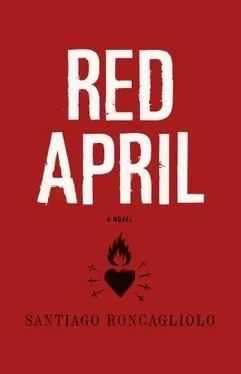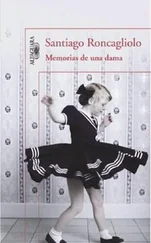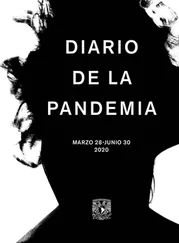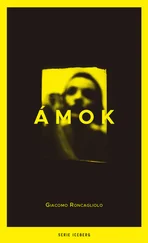Between the entrance building and the cell blocks there was a second ten-meter-high wall, topped by barbed wire and separated from the exterior wall by a no-man's-land, a gray, arid area eight meters wide where anything that moved would be shot.
To Associate District Prosecutor Félix Chacaltana Saldívar, the no-man's-land seemed like a first inkling of hell: the prisoners locked behind the grating in the cell blocks, their empty stares that had not seen anything but those walls for ten years, the police playing cards and wiping the sweat from their necks with the braid on their uniforms, knowing it was not a good place for promotions and eventually spitting out their frustration at the prison bars. For sixteen prisoners serving life sentences in Cell Block E, that enclosed, desertlike strip of land was simply the last piece of relatively free terrain they saw, so they would never forget that they would never walk there again.
They climbed to the second floor of the entrance building. Standing at the top of the stairs, a tall white officer, almost completely bald though still a young man, was waiting for them. He had on a short-sleeved shirt and wore no kepi. The entrance guard gave him a military salute. He called him Colonel Olazábal. The colonel asked him to leave them alone.
“We haven't been informed of any inspection,” he said disagreeably.
The prosecutor attempted to justify himself:
“I am not here for a formal inspection. This is only a personal interview.”
“I'll reply only with my superior present.”
“It is not with you but with the inmate Hernán Durango González.”
“I cannot allow unscheduled interviews without orders.”
The prosecutor felt he was confronting the final wall before he could see his suspect. He observed the pistol in the officer's belt. He thought that he had a weapon too. A double-edged one. He said:
“Call Commander Carrión, please. He will tell you what you want to know. But he will not like anyone questioning his authority.”
Then, it was as if the colonel had stumbled. His eyes opened wide, his entire body became rigid except for his face, which he tried to stretch into a smile. The prosecutor continued:
“I am working on an investigation for the General Staff regarding …”
“You don't need to tell me,” the colonel interrupted. “Our doors are always open for the commander.”
Suddenly everything moved faster. The officer left him with a corporal who would take him to his prisoner. With him as an escort, Prosecutor Chacaltana crossed the no-man's-land and entered the cell blocks. They turned to the right. In the long corridor of Cell Block E they passed faces filled with stony, silent curiosity. They reached a central courtyard. Between the barred windows were worktables for handicrafts and manual labor. Some of the prisoners were putting together fishing rods or making weights.
“Did you come to review our sentences?” asked one of the inmates.
“Quiet, damn it,” said the corporal. And then he shouted into the air: “Hernán Durango González!”
The prosecutor saw the prisoners' eyes all fixed on him, on this man in a suit and tie who could be anybody, perhaps a lawyer. The prosecutor took charge of the situation. He felt pity. He said to the prisoner:
“I will try to have your case reviewed, Señor. Write down your information for me and I …”
The policeman laughed. He said to the prosecutor:
“You're going to have this motherfucker's case reviewed? It's already been reviewed. He killed twenty-six people, six of them children. All in cold blood. Review it again if you want.”
The prisoner did not respond. He seemed annoyed. Another prisoner approached from the other side, thin, dark, with icy eyes. He said he was Hernán Durango González. He preferred to be called Comrade Alonso. The corporal handcuffed the terrorist and led him and the prosecutor to an office in the entrance tower, where they could have a private interview. While the prosecutor was thinking about what to say, the prisoner spoke first:
“If you're going to ask me for information in exchange for benefits, forget it. I won't betray my comrades.”
The prosecutor had expected this direct challenge, the first effort at intimidation. He had read about it in countless manuals on the antisubversive war. He had also read the response. The scorn:
“Your comrades? Your comrades no longer exist. They have all been arrested. The war is over. Don't you watch TV?”
Hernán Durango González fixed his eyes on the prosecutor's. He seemed to be engaged in a staring contest, waiting for the prosecutor to look away. The terrorist's gaze was difficult to endure. No. He could not lower his eyes. He tried to conceal the shudder that ran down his spine. He had been told that confessed terrorists attempt to impose themselves in interrogations, that one needs a good deal of personality or a couple of blows from a rifle butt to tame them. He tried to look up, to not be deflected from the subject:
“I have come to ask you about a person you knew: Edwin Mayta Carazo.”
The terrorist seemed surprised.
“Edwin?”
“Do you remember him?”
Durango seemed to recover and try to gain ground.
“I won't talk.”
“He was arrested ten years ago. After he was freed, he became clandestine.”
“Freed?” In spite of the smile formed by his mouth, the terrorist maintained a gaze as steely as a bullet. “He was arrested by Dog Cáceres. Cáceres didn't free suspects. He got rid of them.”
The prosecutor remembered that he should not debate, that he should not be provoked into an argument. He had been told that terrorists argued only to confuse, lied as a distraction, shielded themselves behind the worst falsehoods. The prosecutor took a deep breath:
“That is what is recorded in our files.”
“And are Cáceres's murders recorded in your files? And when he said better a hundred dead half-breeds than one live terrorist?”
“I have not come to talk about …”
“Do you know how Lieutenant Cáceres trained his men? He made them kill dogs and eat their intestines. The soldier who refused would be treated like a dog. That's how Cáceres got his name. Where's that in your files?”
The prosecutor remembered the dogs in Yawarmayo. He tried to move the memory out of his head, as if he were brushing away a mosquito.
“Señor Durango, for now I will ask the questions.”
“Ah, right. I forgot who it is you work for.”
The prosecutor wanted a glass of water. He realized there was nothing in the office where they were, no water, no bathroom, no decorations, only two chairs and a desk that was clear except for a small Peruvian flag. He decided to continue:
“According to the information at my disposal, it is not clear if Edwin in fact was part of Sendero Luminoso or if he was innocent …”
“And you? Are you innocent? And your superiors? Are they innocent?”
“I am referring to the question of whether he committed acts of terrorism …”
“Of course. If you kill with homemade bombs it's called terrorism, and if you kill with machine guns and hunger it's called defense. It's a play on words, isn't it? Do you know what the difference is? We don't care. But your people piss with fear without a machine gun in their hands.”
Almost twenty years earlier, in his last visit to Ayacucho, the prosecutor had flown over the area surrounding Huanta in a military helicopter as the guest of a captain who was a friend of his. In the middle of the flight over the mountains, a man came out of the scrub carrying a red flag. He was alone. And he ran in front of the helicopter displaying the flag. The soldier on board had a Star machine gun. He fired. The pilot changed the route to follow the flag. The man on the ground ran as fast as he could, pursued by bursts of machine-gun fire that tried to catch him before he returned to the underbrush. But when the man with the flag reached some bushes that could have hidden him, he kept on, he continued running through the clearings with his flag like red spittle in the face of the military. He did not hide and went on for hundreds of meters, scorning the natural hiding places along the way and followed by the dust raised by the bullets coming closer and closer to his heels. After five minutes of pursuit, the bullets hit him, first in the legs and then, when he had fallen, in the back and chest as he dedicated his final movements to keeping the flag in the air. The shooter congratulated himself as if he had shot down a bird, and continued firing as he shouted insults at the man down below who would never hear them now.
Читать дальше












